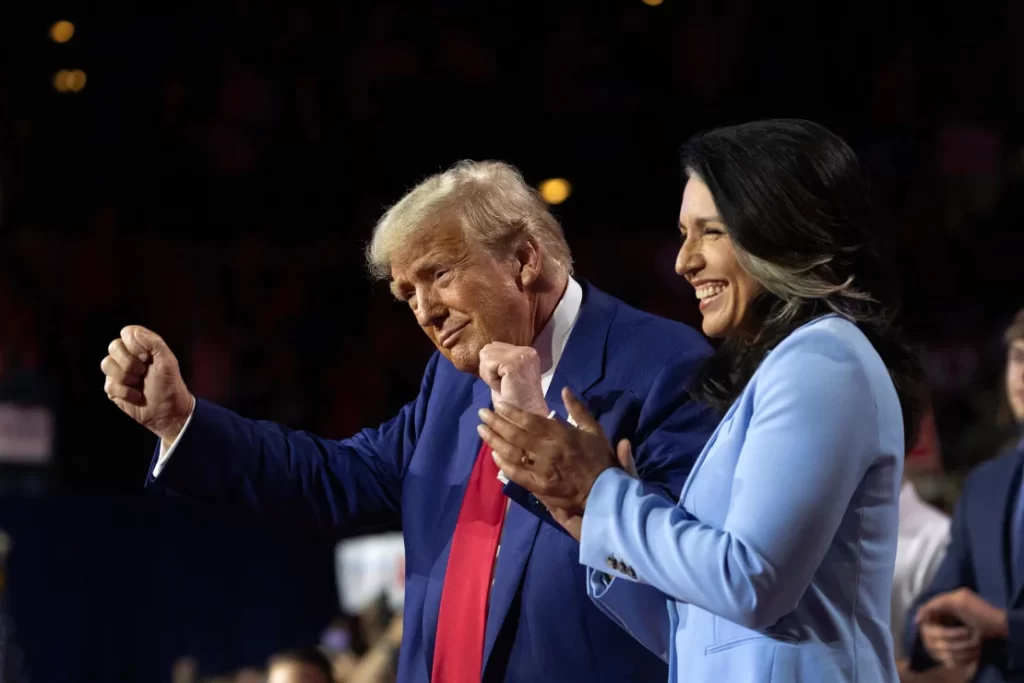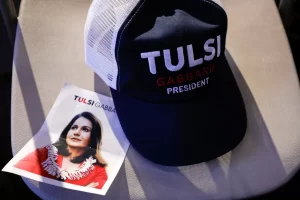Trump’s pick for intel chief has deeply rooted distrust of agencies she would oversee
4 min read
Donald Trump holds a town hall campaign event with Tulsi Gabbard on August 29 in La Crosse, Wisconsin. Scott Olson/Getty Images

Donald Trump holds a town hall campaign event with Tulsi Gabbard on August 29 in La Crosse, Wisconsin. Scott Olson/Getty Images
Donald Trump’s selection of Tulsi Gabbard to serve as the nation’s Director of National Intelligence (DNI) has raised eyebrows, given her unconventional positions on key national security issues. Known for her vocal distrust of the intelligence community, Gabbard has previously aligned herself with some of the most controversial figures in recent U.S. history, including those accused of leaking classified information. Her appointment signals a potential shift in U.S. intelligence oversight, but it also brings into focus her deeply held skepticism about government surveillance and her unusual political trajectory.
Gabbard’s ties to controversial figures such as Edward Snowden, Julian Assange, and Daniel Ellsberg are central to her nomination. In 2020, Gabbard introduced bills that defended whistleblowers like Snowden, who revealed widespread surveillance programs by the NSA, and Assange, the founder of WikiLeaks, who exposed U.S. diplomatic cables and military documents. Gabbard has repeatedly criticized U.S. intelligence agencies for their methods and their treatment of whistleblowers, arguing that they should not be prosecuted under the Espionage Act. These positions put her at odds with many national security experts, who believe the disclosures harmed U.S. security efforts.
Gabbard’s skepticism toward surveillance is evident in her past legislative efforts, including a 2020 bill aimed at repealing key provisions of the Patriot Act and the Foreign Intelligence Surveillance Act (FISA), both enacted after the September 11 attacks to enhance intelligence-gathering capabilities. She has argued that such laws infringe on civil liberties by giving intelligence agencies too much power to monitor American citizens. This position aligns her with a growing libertarian-leaning faction of the Republican Party, which is wary of government overreach. However, her views also put her at odds with the broader intelligence community and some of the very agencies she would be tasked with overseeing.
Gabbard’s selection has also raised concerns about her foreign policy stances, particularly regarding Syria and Russia. Her opposition to U.S. military involvement in Syria and her meetings with Syrian President Bashar al-Assad in 2017 have led critics to accuse her of sympathizing with authoritarian regimes. In 2022, she echoed Russian narratives about NATO’s eastward expansion provoking the invasion of Ukraine and even promoted discredited claims about U.S. biolabs in Ukraine. These positions have alarmed those within the U.S. intelligence community, who view her rhetoric as aligning too closely with foreign adversaries, particularly Russia.

At the same time, Gabbard’s foreign policy views have earned her support from a diverse coalition that spans both the far-left and the libertarian-right, including figures like Sen. Rand Paul and former Rep. Justin Amash. This coalition, which includes some Trump allies, has long opposed U.S. military interventions, particularly in the Middle East, and advocates for a more isolationist foreign policy. However, Gabbard’s stance on Russia and her public praise for Russian narratives about the Ukraine conflict have made her a divisive figure, with even prominent Republicans like former national security adviser John Bolton and GOP presidential candidate Nikki Haley criticizing her views.
One of Gabbard’s most controversial claims is her assertion that the U.S. intelligence community is part of a “cabal of warmongers” within Washington, who she believes are pushing the U.S. toward nuclear conflict. This rhetoric, which she has often voiced on Fox News, frames the U.S. intelligence community as deeply corrupt and motivated by self-interest, rather than national security. Her distrust of the intelligence agencies is rooted in her belief that they are “accountable to no one,” an attitude that has only grown stronger since her time in Congress.
Gabbard’s political evolution—from a Democratic congresswoman with an anti-war, populist platform to a vocal Trump supporter and Republican figurehead—has been marked by a willingness to challenge both party orthodoxy and the institutions of government. Her 2024 memoir touches on her sense that the political elite, both in the Democratic and Republican parties, are out of touch with the concerns of ordinary Americans. She has portrayed herself as a defender of civil liberties and constitutional rights, while simultaneously advocating for a foreign policy that minimizes U.S. intervention abroad.
Despite her positions, Gabbard’s lack of formal experience within the intelligence community has raised doubts about her ability to manage the vast network of U.S. intelligence agencies. Critics argue that her anti-surveillance stance and populist rhetoric might clash with the established needs of U.S. intelligence agencies, which rely on extensive data collection and surveillance to protect national security. If confirmed as DNI, Gabbard would likely face significant opposition from the Pentagon and Congress, particularly regarding her stance on the Patriot Act and FISA, which are cornerstones of post-9/11 surveillance practices.
In conclusion, Gabbard’s selection as DNI is a bold move that highlights a growing faction within the Republican Party that is skeptical of government surveillance and foreign military interventions. However, her views on intelligence, surveillance, and foreign policy will likely generate significant friction with both the intelligence community and traditional national security policymakers. Whether she can successfully navigate these tensions, or whether her appointment will result in a reshaping of U.S. intelligence priorities, remains to be seen.